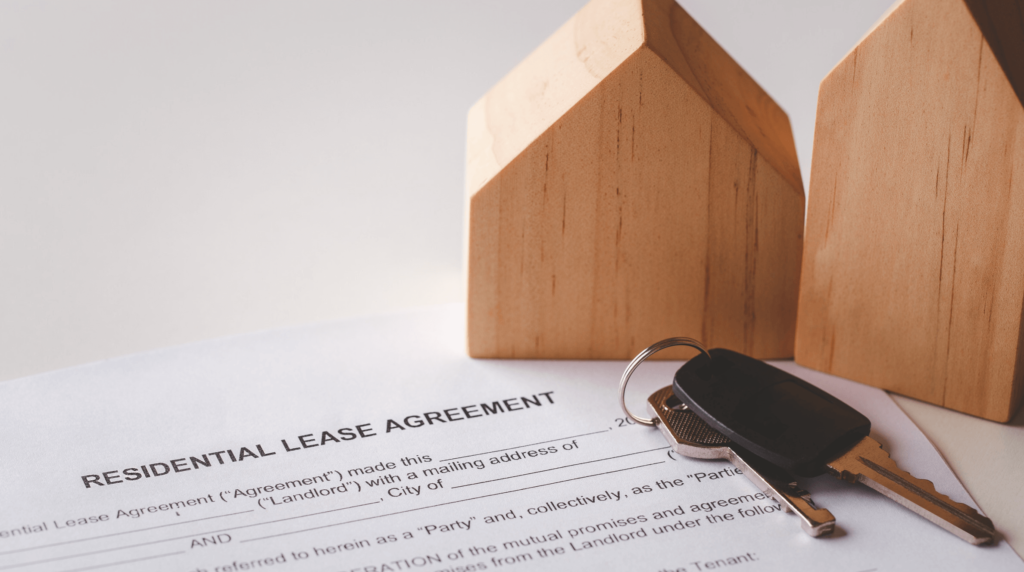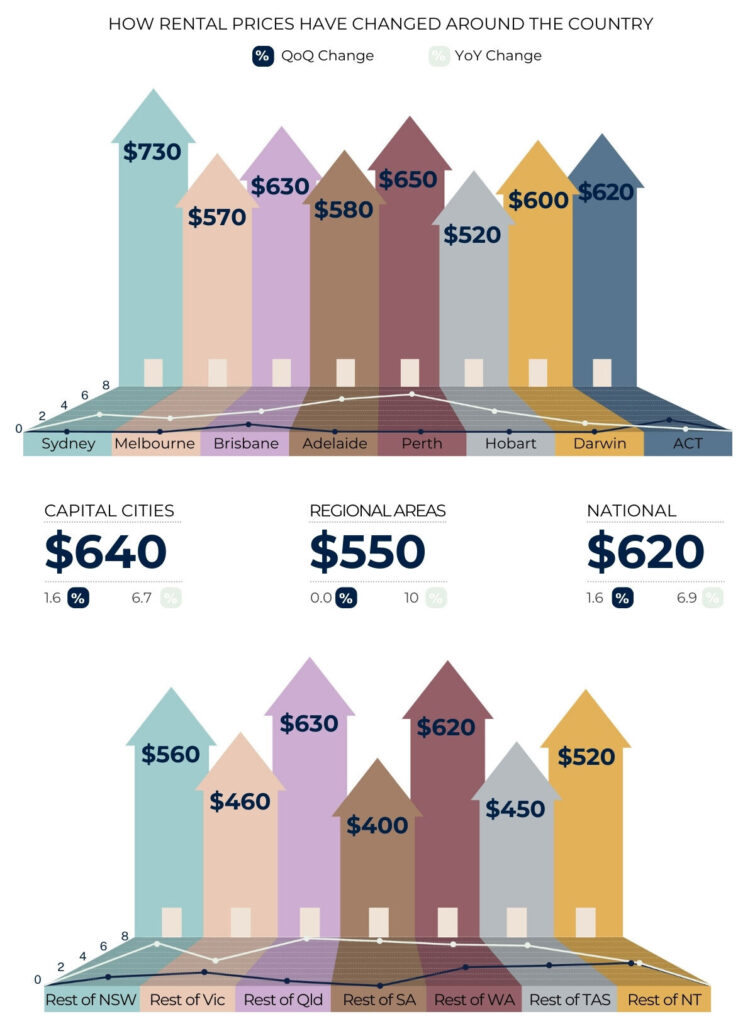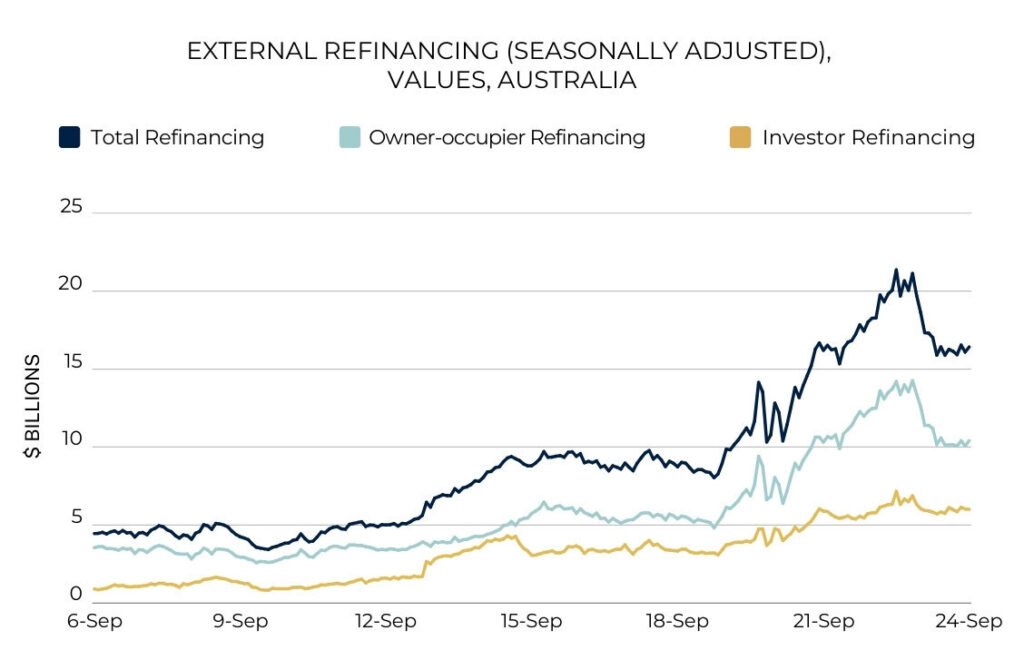Rateseeker Round-up: January Property News

As we step into 2025, Australia’s property market is entering a new era, bringing fresh opportunities and challenges for home buyers, investors, and homeowners alike. After nearly two years of rising property values, median home prices dipped in December 2024 for the first time in 22 months, signalling a potential shift towards a buyer’s market. At the same time, rental growth is slowing, refinancing opportunities are increasing, and government support for first-home buyers remains strong.
Understanding the latest market movements is incredibly important whether you’re buying, investing, or refinancing. Let’s explore what January 2025 means for your property goals.

Mixed Signals in Australia’s Rental Market: What Tenants and Investors Need to Know
Australia’s rental market is currently presenting a blend of encouraging and challenging trends for both tenants and property investors.
According to PropTrack, the national median rent reached a record $620 per week by the end of 2024. However, the pace of rental growth has slowed, with a 1.6% increase in the December quarter—the slowest rate since 2021.
What Does This Mean For Tenants?
The recent slowdown in rental growth brings a welcome respite for tenants, especially those diligently saving for their first home. This pause in rising rents offers a glimmer of hope for many struggling to keep up with escalating housing costs. Despite this positive development, the rental market continues to tilt in favour of landlords, who enjoy the advantage of consistently low vacancy rates.
As of January 2025, the national vacancy rate has plummeted to an astonishing 1%, marking the lowest point in recent years. This significant decline indicates an exceptionally tight rental market, where demand far outstrips supply. As a result, many tenants may find themselves in competitive situations when seeking housing, while landlords remain in a strong position to maintain their rental prices and attract potential renters.

Property Investors Should Keep In Mind:
For property investors, the outlook on rental income is cautiously optimistic. While rents are projected to continue their upward trajectory, the pace of growth is expected to be more tempered compared to the significant increases seen over the past three years. This shift underscores the importance of setting realistic expectations when conducting rental reviews.
Engaging with property managers has never been more crucial. They possess valuable insights into local market conditions, which can guide investors in making informed decisions. By understanding the nuances of the market, property owners can adjust their strategies accordingly.
Additionally, it’s important to recognise that tenants are becoming increasingly price-sensitive. As a result, overestimating rental income may lead to extended vacancy periods, which can ultimately affect overall profitability. By staying on top of market realities and fostering open communication with property management, investors can navigate these changing dynamics effectively and make the most of their investments.
What’s To Come:
The rental market is constantly evolving, shaped by a dynamic mix of factors such as housing supply, migration patterns, and economic conditions. As cities grow and populations shift, it’s essential for both tenants and investors to stay ahead of these trends. Being informed about these changes not only helps navigate the market effectively but also opens up opportunities for smart decisions in a tricky landscape.
Tenants should be aware of local market dynamics, such as rental prices and availability, while also considering their own needs and preferences. On the other hand, investors must keep a keen eye on market fluctuations and understand how supply and demand influence property values and rental income.
Both groups can successfully navigate this ever-evolving landscape by remaining adaptable and proactive, making informed decisions that align with their goals and circumstances. Staying attuned to industry news and trends will provide a competitive edge in a rental market that is anything but static.
Looking to purchase a home in 2025 and leave the rental market behind? Get in touch with our team at Rateseeker and we can help you arrange pre-approval and secure the sharpest rate for your loan.

Navigating First Home Buyer Assistance Programs in 2025
Stepping into the Australian property market for the first time can feel overwhelming, but it doesn’t have to be! Thanks to a range of government initiatives to support new buyers, the journey to homeownership is becoming more accessible and exciting. Let’s explore the key programs available in 2025 to help turn your dream of owning a home into a reality!
Federal Government Initiatives To Help Home Buyers
First Home Guarantee (FHBG): This program allows eligible first-home buyers to purchase a property with as little as a 5% deposit without needing Lenders Mortgage Insurance (LMI). For the 2024-25 financial year, 35,000 places are available under this scheme.
Regional First Home Buyer Guarantee (RFHBG): Tailored for those looking to buy in regional areas, this guarantee also enables purchases with a minimum 5% deposit and no LMI requirement.
Help to Buy Scheme: Expected to launch later this year, this shared-equity program allows buyers to reduce their purchase cost to as little as 60% of the property’s value by offering the government a stake of up to 40% in the property.

State and Territory Programs To Aid Home Buyers
In addition to federal initiatives, various state and territory governments offer grants and concessions to assist first-home buyers:
- New South Wales: A $10,000 First Home Owner Grant is available for new homes valued up to $600,000. Additionally, stamp duty exemptions apply for properties valued up to $800,000, with concessions available for homes up to $1 million.
- Victoria: First-home buyers can access a $10,000 grant for new homes valued up to $750,000. Stamp duty exemptions are available for properties up to $600,000, with concessions for homes valued between $600,001 and $750,000.
- Queensland: A generous $30,000 grant is offered for contracts signed between 20 November 2023 and 30 June 2025 for new homes valued up to $750,000. Stamp duty concessions are also available for properties up to $800,000.
- Western Australia: Eligible first-home buyers can receive a $10,000 grant for new homes, with stamp duty exemptions for properties valued up to $450,000.
- South Australia: A $15,000 grant is available for new residential properties, with stamp duty concessions for homes valued up to $700,000.
- Tasmania: First-home buyers can access a $10,000 grant for new homes, with stamp duty concessions for properties valued up to $750,000.
- Australian Capital Territory: While no First Home Owner Grant exists, the Home Buyer Concession Scheme offers stamp duty exemptions for properties valued up to $1 million, subject to income thresholds.
- Northern Territory: A substantial $50,000 grant is available for new homes, with additional assistance through the HomeBuild Access program. Eligible buyers can purchase with a 2.5% deposit.
More Help Needed?
The federal government is shaking up lending regulations in an exciting move to empower first-home buyers! By directing financial regulators to ease restrictions, especially for those with university debts, they’re making it easier for young buyers to step onto the property ladder. This new initiative will boost borrowing capacity by excluding HELP (Higher Education Loan Program) repayments from serviceability assessments, giving aspiring homeowners a greater chance at achieving their homeownership journey.
Important Things To Consider:
- Eligibility Criteria: Each program has specific requirements, including property value caps, income thresholds, and residency conditions. It’s essential to review these criteria to determine your eligibility.
- Application Process: Some grants and schemes have limited places and may require pre-approval. Early application is advisable.
- Long-Term Implications: Shared equity schemes, like Help to Buy, involve the government owning a stake in your property. Consider how this aligns with your long-term financial goals.
Navigating the array of assistance programs can be complex. Consulting with a mortgage broker or financial advisor can provide personalised guidance to help you make informed decisions on your path to homeownership.

Is It Time to Refinance? 5 Signs You Could Be Paying Too Much on Your Mortgage
Many Australian homeowners make the mistake of taking out a home loan and then neglecting it for years. However, the reality is that the mortgage market is constantly changing, and your financial situation can also change significantly over time. This means that the loan you obtained a few years ago may no longer be the best option for you today.
Refinancing can help you:
- Secure a lower interest rate and reduce your repayments
- Access better loan features like offset accounts or redraw facilities
- Use built-up equity to invest or renovate

So, how do you know if it’s time to reassess your mortgage? Here are five key signs that refinancing might be a smart move.
1. It’s Been More Than Two Years Since You Took Out Your Loan
The lending landscape is a fickle beast, constantly changing and being affected by a variety of factors —new loan products, rate adjustments, and borrower incentives emerge regularly.
- If your loan is 2+ years old, there’s a good chance you’re missing out on a better deal.
- Banks often reserve their best rates for new customers, leaving loyal borrowers stuck on higher rates.
- Switching lenders (or even negotiating with your current one) could lead to significant savings.
Action Step: Compare your current interest rate with what’s available in the market today. If there’s a better deal, refinancing could put extra cash in your pocket.
2. Your Financial Situation Has Changed
Just as your lifestyle evolves, your mortgage should, too. If you’ve experienced any major financial changes etc., your current home loan may no longer be the best fit.
- Higher income? You might want to refinance to a loan that allows extra repayments so you can pay off your mortgage faster.
- New financial commitments? You may need to adjust your loan structure to reduce financial stress.
- Credit score improvements? If your credit score has gone up, you may qualify for a lower interest rate.
Action Step: Speak to your trusted mortgage specialist and assess whether your current loan aligns with your financial goals. If not, refinancing could give you more flexibility and financial control.
3. Your Fixed-Rate Period is Ending
Many Australians locked in low fixed rates over the past few years, but as these fixed terms expire, borrowers are being kicked head-first onto much higher standard variable rates.
- Most fixed-rate loans automatically revert to a lender’s standard variable rate—which is often significantly higher than what’s available elsewhere.
- Instead of accepting this rate hike, shop around and see if another lender can offer a better deal.
Action Step: If your fixed-rate term is about to expire, start exploring refinancing options at least 3 months in advance so you don’t get stuck with a high variable rate.
4. You’ve Built Up Equity in Your Property
As property values increase, homeowners gain more equity—which can open the door to better loan deals.
- If you now own more than 20% of your home’s value, you may be able to eliminate Lenders Mortgage Insurance (LMI).
- A stronger equity position may also mean access to lower interest rates or better loan features.
Action Step: Check your loan-to-value ratio (LVR)—if it’s improved, you may qualify for a cheaper home loan through refinancing.
5. You Want to Use Equity for an Investment or Renovation
If you’re looking to grow your wealth through property investment or upgrade your current home, refinancing could be the key to unlocking your next move.
- Many lenders allow cash-out refinancing, where you access your built-up equity and use it for:
- A deposit on an investment property
- Home renovations or upgrades
- Debt consolidation to reduce high-interest payments
Action Step: Work with a mortgage expert to calculate how much equity you can access and explore how refinancing could help you achieve your financial goals.
Refinancing isn’t just about saving money—it’s about maximising your financial potential. If any of these five signs resonate with you, it’s time to take action.
You could be paying far more than you need to on your mortgage—so why not find out? A quick home loan review could save you thousands and put you on the path to greater financial freedom. Get in touch with our experienced team at Rateseeker and we can help you secure the sharpest rates on your new loan.

Why Buyers May Have the Upper Hand In 2025
After nearly two years of non-stop price growth, Australia’s property market has finally hit a turning point. CoreLogic reports that median property prices fell by 0.1% in December 2024—the first decline after 22 consecutive months of increases. While the drop is small, it signals a potential shift toward a buyer’s market in 2025.
If you’re looking to purchase a home this year, this could be your chance to take control. With less buyer competition and greater room for negotiation, savvy buyers can capitalise on market conditions—but preparation is a must.
Why 2025 is Looking Good for Buyers
Over the past two years, the Australian housing market strongly favoured sellers, with rapid price hikes and fierce competition making it tough for buyers to secure a home. But that dynamic is changing. Here’s what to expect:
Less Competition from Buyers
- Fewer buyers in the market means less pressure to make rushed decisions.
- You’ll have more time to research, compare properties, and negotiate without the FOMO.
Better Bargaining Power
- Sellers will need to be more flexible—offering discounts, longer settlement periods, or including incentives like paying for stamp duty.
- If a property has been sitting on the market longer than expected, buyers may have room to negotiate on price.
More Time for Due Diligence
- In the competitive markets of 2023 and 2024, buyers often had just days (or hours) to make an offer.
- In 2025, you’ll likely have time to properly assess properties, conduct inspections, and compare mortgage options before signing on the dotted line.
While this shift doesn’t mean prices will crash, it does indicate a more balanced market, where buyers can enter with greater confidence.
How to Prepare for Buying in 2025
Even in a market that favours buyers, preparation is crucial. Here’s how to put yourself in the best position before you start house-hunting:
1. Strengthen Your Financial Position
Cut Back on Unnecessary Spending
- Lenders assess your financial behaviour, so reducing discretionary spending can improve your borrowing power.
- Avoid taking on new credit cards or loans in the months leading up to applying for a mortgage.
Check Your Credit Report
- Order a free credit report to spot any errors that could impact your loan application.
- If you find incorrect information, apply to have it removed before applying for a home loan.
- A strong credit score can help you secure lower interest rates and better loan terms.
2. Get Home Loan Pre-Approval
Why Pre-Approval Matters:
- It clarifies your budget so you know exactly how much you can afford before you start looking.
- Sellers take pre-approved buyers more seriously, giving you an advantage in negotiations.
- You’ll have the confidence to act quickly if you find the right property.
Work with a trusted mortgage expert to compare home loan options and secure a competitive rate. Even a small difference in interest rates can save you thousands over the life of your loan.
3. Be Savvy About Choosing Your Property
With more homes expected to hit the market this year, buyers have a unique opportunity to be selective. Instead of feeling rushed, use this time to get your ducks in a row by:
Get to know your ideal suburbs and market trends
- Some areas will see more substantial price corrections than others.
- Look for locations with planned infrastructure developments, strong rental demand, and economic growth.
Negotiate settlement terms
- Sellers facing longer listing periods may agree to more favourable terms, such as a lower price, extended settlement period, or additional inclusions like furniture or repairs.
Consider off-market deals
- Some sellers want to sell quietly, avoiding public listings, hassle and associated fees.
- Working with a buyer’s agent or staying in contact with local real estate agents can help you access off-market opportunities.
For the first time in years, buyers seem to have an advantage in Australia’s property market this year. While prices aren’t expected to drop dramatically, the slower pace of growth means less competition, better deals, and more room to negotiate.
If you’re planning to buy this year, the key is preparation. Fortifying your financial position, getting home loan pre-approval under your belt, and understanding the local market trends will put you in the best position to make a smart, confident property purchase.
Need help with pre-approval or finding the right mortgage? Contact our team at Rateseeker today, and let’s map out your path to homeownership in 2025.
** General Advice Warning
The information provided on this website is general in nature only and it does not take into account your personal needs or circumstances into consideration. Before acting on any advice, you should consider whether the information is appropriate to your needs and where appropriate, seek professional advice in relation to legal, financial, taxation, mortgage or other advice.




